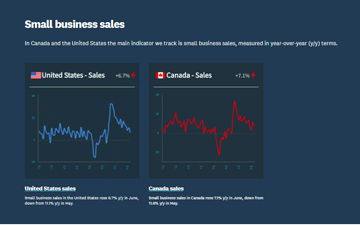The state of Canadian small businesses and why that matters for accountants

The latest data from Xero Small Business Insights shows Canadian small business sales growth is slowing but is still higher than the 2021 average
CANADIAN Small Business Month is coming to a close, presenting a natural moment in time to reflect on the impact our country’s small businesses have on the national economy. The past two-plus years have been difficult for these businesses, as they’ve felt the weight of the pandemic followed quickly by mounting inflation.
As a global small business platform, we at Xero dedicate a lot of time understanding the financial health of our small business customers and the various factors contributing to that health. Additionally, we prioritize getting regular reads on the small business landscape generally, gauging businesses’ approach toward things like the year-end tax process. Just as there is much insight for us to glean from the current state of Canadian small businesses, accountants and advisors should take note as well.
Cost of living pressures slowed small business sales growth over the summer
In our latest Xero Small Business Insights (XSBI) update, published on October 27, we looked back at the country’s latest available small business data, from April to June 2022. The XSBI program looks at the small business economy’s financial performance, drawn from anonymized and aggregated data collected from Xero small business customers.
To summarize: in Canada, small business sales growth slowed and payment times showed some modest improvement over the three months, but are still higher than the 2021 averages. The slowdown in sales growth most likely reflects the impact of inflation rising faster than wages which is limiting the capacity of customers to spend.
Key findings include:
- Sales growth slowed to 7.1% year-over-year in June, after averaging 10.6% y/y in the first three months of 2022. This likely reflects cost of living pressures on small business customers.
- Time to be paid, which measures how long small businesses are waiting on average to be paid for invoices they have issued, averaged 29.4 days in the three months to June 2022, 0.8 days quicker than for the three months to March.
- Late payment times reduced slightly. Small businesses were paid, on average, 7.7 days late in the three months to June. This is 0.5 days shorter than the average for the three months to March.
With sales growth continuing to slow, less purchasing power in Canadians’ pockets, and the holiday season around the corner, ensuring the health of our small businesses should be a priority and focus for the country — especially amid a volatile economic environment — and no one is better suited to help than advisors.
It is essential for Canadian accountants and advisors to have an accurate pulse on the state of the industry, and the factors contributing to it, to successfully guide their small business clients. Advisors should encourage small business clients to use the latest technological enhancements — such as cloud-based accounting platforms — to stay informed on their costs and profit margins, as well as help track financial transactions in real-time.
Small businesses and the year-end tax process
Another area we’ve looked into is how small businesses are approaching essential tasks like year-end taxes, and their attitudes surrounding completing such tasks. A new survey we recently conducted with Logit Group found that two-thirds of small business owners think tax season considerably impacts their work-life balance. Of those surveyed, 44% of small businesses agree the process is a significant contributor of stress, and that cloud-based digital tools significantly help alleviate that stress.
For accountants and advisors specifically, there were some other interesting takeaways:
- The year-end tax process takes almost half of small businesses over a month or longer to complete.
- 88% of small business owners agree that cloud-based tools save them money, and 61% said the tools save them time, noting the simplicity and ease-of-use helps their day-to-day.
- Time is the biggest limitation when it comes to filing year-end taxes, followed by expertise and gathering data.
- Many small businesses continue to rely on old-fashioned paper and hand delivery to provide corporate documents to their accountant.
Technology is certainly making life easier for small businesses, though humans are still very much essential when it comes to accounting processes and why advisors are so crucial to the success of this country’s entrepreneurial spirit. Small business success is ultimately about people. The right combination of cloud-based tools and expert guidance can go a long way in helping ease the stress and burdens small businesses face when it comes to tasks like year-end processes.
Faye Pang is the Canada Country Manager at Xero. Click here to learn more about Xero Small Business Insights (XSBI).





(0) Comments